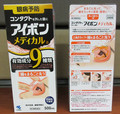Unauthorized health products seized from Tokyo Beauty & Health Care in Richmond, B.C., may pose serious health risks
- Starting date:
- March 31, 2021
- Type of communication:
- Advisory
- Subcategory:
- Drugs
- Source of recall:
- Health Canada
- Issue:
- Unauthorized products
- Audience:
- General Public
- Identification number:
- RA-75279
Last updated:
2021-03-31
Summary
- Product: Multiple unauthorized health products (including eye drops, an eyewash and an acne gel) from Tokyo Beauty & Health Care in Richmond, B.C.
- Issue: Products are unauthorized and labelled to contain prescription drugs, which may pose serious health risks.
- What to do: Stop using these products. Consult your health care professional if you have used any of these products and have health concerns.
Issue
Health Canada has seized several health productsâincluding eye drops, an eyewash and an acne gelâfrom Tokyo Beauty & Health Care in Richmond, British Columbia (#120, 8191 Westminster Highway), because they are unauthorized and may pose serious health risks.
According to the product labels, the products contain prescription drugs (see table below for details). Prescription drugs should be taken only under the advice and supervision of a health care professional because of the risk of interactions with other medications and side effects. Prescription drugs can only be legally sold via a prescription.
Unauthorized health products have not been approved by Health Canada, which means that they have not been assessed for safety, effectiveness and quality and may pose serious health risks. They may contain ingredients, additives or contaminated ingredients not listed on the label. In addition, they may lack the active ingredients Canadians would expect them to contain to help maintain and improve their health or they may contain ingredients that could interact with other medications and foods. For all of these reasons, unauthorized health products could cause serious health effects. Selling unauthorized health products in Canada is illegal.
Some of the unauthorized health products are packaged and labelled in Japanese characters. As a result, information about ingredients, usage, dosage and side effects may not be understood by all consumers.
Health Canada has previously seized unauthorized products being sold by this retailer and will continue to take action to address this illegal activity and update Canadians as needed.
Affected products
| Photo | Product | Risk |
|---|---|---|
|
Dalacin T Gel 1% |
Labelled (in Japanese) to contain clindamycin |
|
|
Kobayashi Aibon/Eyebon Eyewash ALd (dark green) |
Labelled (in Japanese) to contain aminocaproic acid |
|
|
Kobayashi Aibon/Eyebon Eyewash Medicala (black) |
Labelled (in Japanese) to contain aminocaproic acid |
|
|
Kobayashi Aibon/Eyebon Eyewash Mild (light green) |
Labelled (in Japanese) to contain aminocaproic acid |
|
|
Santen Sante Beauteye Contact |
Labelled (in Japanese) to contain neostigmine methylsulfate |
|
|
Santen Sante FX Neo (silver package) |
Labelled (in English) to contain neostigmine methylsulfate and aminocaproic acid |
|
|
Santen Sante FX Neo (blue package) |
Labelled (in Japanese) to contain neostigmine methylsulfate and aminocaproic acid |
|
|
Santen Sante FX Vplus (gold package) |
Labelled (in English) to contain neostigmine methylsulfate and aminocaproic acid |
|
|
Santen Sante FX Vplus (red package) |
Labelled (in Japanese) to contain neostigmine methylsulfate and aminocaproic acid |
|
|
Santen Sante PC |
Labelled (in Japanese) to contain neostigmine methylsulfate |
What you should do
- Stop using these products. Consult your health care professional if you have used any of these products and have health concerns.
- Read product labels to verify that health products have been authorized for sale by Health Canada. Authorized health products have an eight-digit Drug Identification Number (DIN), Natural Product Number (NPN) or Homeopathic Drug Number (DIN-HM). You can also check whether products have been authorized for sale by searching Health Canada's Drug Product Database and Licensed Natural Health Product Database.
- Report any health product adverse events or complaints to Health Canada.
Background
Aminocaproic acid: This is a prescription drug ingredient used to decrease bleeding in various clinical situations. Exposure to aminocaproic acid in the eye may affect the eye itself, and the acid may be absorbed through the tear ducts into the blood. Side effects may include watery eyes, vision changes, headache, dizziness, nausea, muscle weakness and skin rash.
Clindamycin: In topical format (i.e., applied to the skin), this is a prescription antibiotic approved in Canada to treat bacterial infections, including those associated with acne. The product should not be used in individuals with a history of ulcerative colitis (inflamed bowel) or a history of inflamed bowel associated with antibiotic use (antibiotic-associated colitis). Side effects may include dry or scaly skin, peeling skin, a stinging or burning feeling on the skin, eye pain, itching, hives, redness and gastrointestinal symptoms (such as indigestion and gas). Safety and effectiveness in children under the age of 12 has not been established.
Neostigmine methylsulfate: There are no approved eye drops containing neostigmine methylsulfate on the Canadian market. In the past, drugs similar to neostigmine were used to treat glaucoma. These medications are no longer widely used because of the significant number of potential eye-related side effects, including blurred distance vision, frontal headaches, twitching lids, red eyes, cataracts, allergic reactions, iris cysts, retinal detachment and the potential for causing a specific type of glaucoma attack. In addition, absorption into the nose via the tear duct may cause serious cardiac and respiratory side effects.
Media enquiries
Health Canada
(613) 957-2983
hc.media.sc@canada.ca
Public enquiries
(613) 957-2991
1-866 225-0709
hcinfo.infosc@canada.ca
Images
Select thumbnail to enlarge - opens in a new window



















